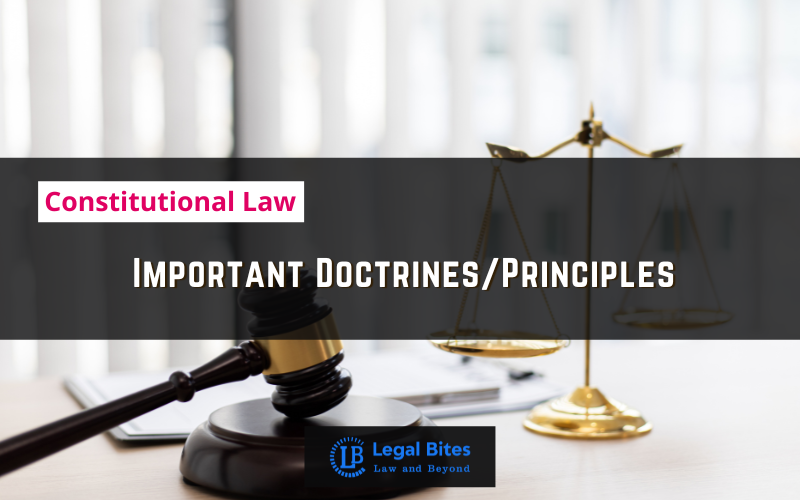Discuss the relationship between the Fundamental Rights and Directive Principles of State Policy.
Find the answer to the mains question of Constitutional Law only on Legal Bites.;

Question: Discuss the relationship between the Fundamental Rights and Directive Principles of State Policy. [BJS 2007] Find the answer to the mains question of Constitutional Law only on Legal Bites. [Discuss the relationship between the Fundamental Rights and Directive Principles of State Policy.] Answer Fundamental Rights as enshrined under Part III of the Indian Constitution are rights without which a human being cannot survive in a dignified manner in a civilized society....
Question: Discuss the relationship between the Fundamental Rights and Directive Principles of State Policy. [BJS 2007]
Find the answer to the mains question of Constitutional Law only on Legal Bites. [Discuss the relationship between the Fundamental Rights and Directive Principles of State Policy.]
Answer
Fundamental Rights as enshrined under Part III of the Indian Constitution are rights without which a human being cannot survive in a dignified manner in a civilized society. Fundamental rights are known as “basic rights”. They are also called individual rights or negative rights” and impose negative obligations on the state not to encroach on individual liberty.
On the other hand, Directive Principles of State Policy as enshrined under Part IV of the Constitution are positive rights and impose positive obligations on the state. Parts III and IV of the Constitution, as described by the CJ. Chandrachud is the conscience of the Constitution of India, however, there is a certain distinction between the Fundamental Rights and Directive Principles of State Policy (DPSPs). They are:
- Fundamental rights aim to establish political democracy in India whereas DPSP refers to the socio-economic policies of the country.
- Directive principles are in the nature of instruments of instructions to the government to do positive. They are not justifiable or enforceable in courts. On the other hand, the fundamental rights are enforceable in the courts under Articles 32 and 226 of the Constitution and hence are justifiable and are considered as negative rights.
- Fundamental rights are facilities given by the state to the people, whereas DPSP is directions given by the constitution to the state.
- Fundamental Rights promote the welfare of individuals and hence are individualistic whereas DPSPs promote the welfare of the community hence they are socialistic in nature.
- Fundamental Rights do not require any legislation for their implementation and are automatically enforced whereas DPSPs require legislation for implementation.
Instead of having certain distinctions, Constitution Framers always talked about the coherence between Fundamental Rights and DPSP. In Kerala Education Bill, 1957 the Apex Court while affirming the primacy of fundamental rights over the directive principles, held that the Court may not entirely ignore these Directive Principles of State Policy laid down in Part IV of the Constitution but should adopt the principle of harmonious construction and should give effect to both as much as possible. The Supreme Court began to assert that there is “no conflict on the whole” between the fundamental rights and the directive principles.
Further, in the landmark judgment of the Kesavanand Bharti v. State of Kerala, (1973) 4 SCC 225, Justice Chandrachud said that “DPSP should not be permitted to become,’ a mere rope of sand’.” If the State fails to create conditions in which the Fundamental freedoms could be enjoyed by all, the freedom of few will be at the mercy of many and then all freedoms will vanish”. The Court held with the majority that the fundamental rights and directive principles constitute the “conscience of the constitution” there is no antithesis between the fundamental rights and directive principles and one supplement the other.
In conclusion, the relationship between Fundamental Rights and DPSP is cohesive in nature now and is an essential part of the basic structure of the Indian constitution. Both are complementary and supplementary to each other. So, it’s the duty of the state to follow the guidelines enumerated in DPSP to protect Fundamental rights.
Important Mains Questions Series for Judiciary, APO & University Exams
- Constitutional Law Mains Questions Series Part-I
- Constitutional Law Mains Questions Series Part-II
- Constitutional Law Mains Questions Series Part-III
- Constitutional Law Mains Questions Series Part-IV
- Constitutional Law Mains Questions Series Part-V
- Constitutional Law Mains Questions Series Part-VI
- Constitutional Law Mains Questions Series Part-VII
- Constitutional Law Mains Questions Series Part-VIII
- Constitutional Law Mains Questions Series Part-IX
- Constitutional Law Mains Questions Series Part-X



